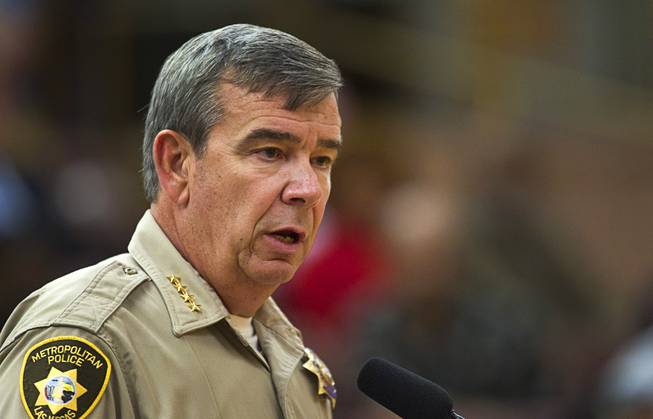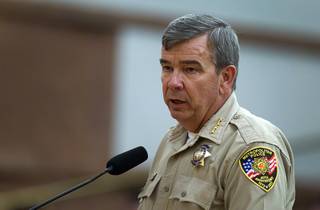
Sheriff Doug Gillespie speaks on the Metro Police budget during a county commission meeting at the Clark County Government Center Tuesday, April 16, 2013.
Monday, Jan. 20, 2014 | 2 a.m.
Sun coverage
- Commission to consider third More Cops tax proposal
- Sheriff proposes compromise tax increase for more cops
- Tortoises, taxes at issue during county commission meeting
- Commission postpones debate on More Cops sales tax hike
- Commissioners divided on ‘More Cops’ proposals
- Bill allows sales tax hike to pay for police
- Hold everything: Commission postpones vote on sales tax increase for Metro Police
- Fate of ‘More Cops’ lies in balance as issue returns to commission
- Commission can’t muster votes to pass ‘More Cops’ tax increase
A decade after it was first introduced in 2004, the More Cops sales tax initiative to hire more police officers throughout Southern Nevada faces a decisive moment Tuesday.
Clark County commissioners have spent time the past six months debating the proposal from all angles, requesting heaps of information from Metro Police on everything from operating budgets to staffing levels to reserve funds.
Although the first part of the sales tax increase, a total of 0.25 percent, was easily enacted after voters approved the measure in the 2004 election, Sheriff Doug Gillespie’s recent effort to gain the second portion of the sales tax has been stymied by skepticism among state and local politicians.
Gillespie has maintained since reviving the proposal in December 2012 that the increased funding is critical for the future of Metro Police and public safety in Southern Nevada. Without it, he says, budget constraints could force Metro to shed 700 officer positions, nearly a fourth of the commissioned force, over the next five years.
Despite months of research and debate, several commissioners still are hesitant to endorse the plan, criticizing the sheriff for his past handling of Metro Police’s budget and worrying new tax revenues won’t increase the number of officers patrolling neighborhoods.
Commissioners will conduct a public hearing and possibly vote on a new version of the More Cops proposal at their meeting Tuesday.
The plan, the fifth revision of the proposal originally presented to commissioners in December 2012, aims to address many of the criticisms by linking the tax increase to depletion of a $140 million reserve fund Metro has built up over the years. As new officers are hired and the reserve shrinks, the tax will kick in over two phases, one in October 2014 and the other a year later, to supplement the hiring.
Tuesday is perhaps Gillespie’s last, best chance to gain approval for the sales tax increase before he leaves office at the beginning of 2015. Commissioners have discussed numerous ways to enact some or all of the 0.15 percent increase authorized by the Legislature, but they have agreed on none, leaving few options remaining.
The commission remains split along the same fissures that have divided them for months, leaving the ultimate fate of the proposal uncertain.
Regardless of the outcome of Tuesday’s vote, the protracted debate has exposed a unique tension among political powers in Clark County, with the sheriff, the region’s top public-safety official, finding the financial future of his agency out of his hands and left to the seven county commissioners.
•••
The stark contrast between the political environment Gillespie has encountered and the situation when the More Cops proposal was first introduced in 2004 tells the tale of two Nevadas.
A decade ago, the region’s economy was booming and local police departments were scrambling to hire enough officers to keep up with the region’s growing population.
Backed by a $1 million campaign that featured television advertisements, then-Sheriff Bill Young encountered little resistance pushing the tax increase in a flush economy, gaining widespread support from elected officials and the backing of the public, which approved a total sales tax increase of 0.5 percent with the proceeds used to hire and equip new police officers.
“It was a completely different environment than it is today. We’ve essentially done a 180,” Young said.
Only 0.25 percent of the taxing authority was enacted initially, in part because police departments wouldn’t be able to spend the new revenues fast enough due to lengthy recruitment and training processes needed to hire new officers.
Gillespie took over from Young in 2007 with an eye on getting the remaining half of the sales tax increase authorized, only to be foiled by the recession and resulting crash of the region’s economy.
Gillespie shelved the proposal for several years, knowing it faced long odds of passage in such a weak economy, even as his department’s budget was cut by a total of $60 million.
When he came before commissioners in December 2012, Gillespie painted a grim picture of rising crime in the city as the number of officers on the streets decreased. Asking initially for the full 0.25 percent increase, Gillespie said the added funding would prevent the elimination of 250 officer positions and allow the department to add new officers while still addressing a $30 million projected shortfall in his upcoming budget year.
Commissioners then voted 5 to 2 to support Gillespie’s efforts to pass the tax through the Legislature, the last easy victory of his now-lengthy lobbying campaign.
The bill encountered resistance in the Legislature over concerns about the size of the tax increase and whether the funding would lead to the hiring of additional officers. Those two questions still linger among several county commission members.
It took a special session of the Legislature in June for passage, but lawmakers ultimately agreed to scale back Gillespie’s request to a maximum 0.15 percent increase and to leave the ultimate decision whether to enact the tax increase to the county commission.
With one hurdle cleared, Gillespie turned his lobbying efforts to the commission.
The proposal has remained stalled ever since, going through a series of failed votes, delayed hearings and retracted proposals as commissioners struggled to reach a consensus.
Several factors have contributed to the proposal’s struggles, including the still-weak state of the economy. With utility fees, water rates, the fuel tax and other costs increasing, commissioners are wary of adding more burden to taxpayers.
Commissioners also have questioned Gillespie’s budgeting practices, especially his decision to hold open vacant-but-funded officer positions on the force to buffer against budget cuts and prevent layoffs.
“He created the problem by purposefully not filling those positions,” Commissioner Chris Giunchigliani said. “It was almost creating a reason for the tax increase by not hiring the staff he needed.”
Other critics have focused on a nearly $140 million reserve fund Gillespie has accumulated from the already-in-place 0.25 percent sales tax levy. Tapping the reserve, critics contend, provides a way to keep hiring officers until the economy has fully recovered and Metro’s budget situation has improved.
•••
Gillespie’s latest proposal, crafted with the help of economist Jeremy Aguero, attempts to assuage those concerns by providing a clear mechanism to ensure any increase in funding translates to more officers, while also spending down a portion of the reserve.
The data-driven proposal will likely get support from Commissioners Tom Collins, Lawrence Weekly and Larry Brown, who have consistently supported the full tax increase. Commissioners Giunchigliani and Steve Sisolak remain opposed, as they have since the proposal was introduced in 2012.
The split leaves Commissioners Susan Brager and Mary Beth Scow as the swing votes that could push the proposal to the five-vote supermajority needed for passage.
Brager and Scow have supported raising the sales tax by 0.075 percent, but both have been reluctant to endorse the full 0.15 percent increase, which Gillespie’s latest proposal would phase in over two years.
Scow said she’s comfortable with the automatic triggers put into the proposal and was leaning toward supporting Gillespie. The one question she’s waiting to have answered is how the sheriff plans to hire so many officers in a short time frame while still recruiting high-quality candidates.
“With the 0.075 percent plan, I think we anticipated the sheriff would eventually come back for the other half,” Scow said. “I want to hear what the sheriff has to say (about recruitment). I’m feeling fairly comfortable with this plan depending on that.”


Join the Discussion:
Check this out for a full explanation of our conversion to the LiveFyre commenting system and instructions on how to sign up for an account.
Full comments policy